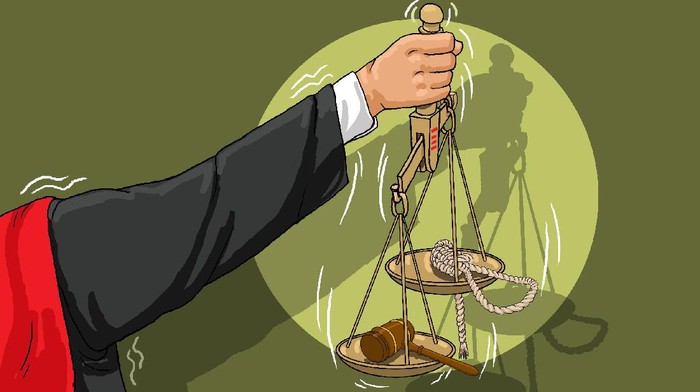Capital Punishment and (in)Justice
Main Article Content
Abstract
Indonesia is a legal state that upholds justice based on Article 1 paragraph 3 of the 1945 amendment. However, the legal condition in Indonesia is currently heavily criticized by the people, especially the small people. Laws in Indonesia are often called blunt-sharp laws that are triggered by the weakness of law enforcement in Indonesia. The condition of justice law in the increasingly bad state of Indonesia greatly affects the health and democratic forces in Indonesia. Failure to realize justice through law in Indonesia must be immediately addressed for the creation of a just state of justice as stipulated in the content of Pancasila. Law enforcement in Indonesia is not in accordance with Article 1 Paragraph 3 of the 1945 Amendment of Amendment which states that Indonesia is a State of law. This study aims to analyze the capital punishment in the context of justice and fairness, as well as human rights perspective.
Article Details

This work is licensed under a Creative Commons Attribution-NonCommercial-ShareAlike 4.0 International License.
The Authors(s) retain copyrights of the Article published on Semarang State University Undergraduate Law and Society Review. However, before publishing, it is required to obtain written confirmation from Author(s) in order to ensure the originality (Author Statement of Originality). The statement is to be signed by at least one of the authors who have obtained the assent of the co-author(s) where applicable. This work licensed under a Creative Commons Attribution-NonCommercial-ShareAlike 4.0 International (CC BY-NC-SA 4.0).
References
Ahmad, I. F. (2021). Why Indonesia Mantain Capital Punishment. Fiat Justicia Jurnal Ilmu Hukum Fakultas Hukum Universitas Lampung, 15(1), 25-38.
Anjari, W. (2018). Penjatuhan Pidana Mati di Indonesia dalam Perspektif Hak Asasi Manusia. E-Journal Widya Yustisia, 1(2), 107-115. https://e-journal.jurwidyakop3.com/index.php/yustisia/article/view/208
Arief, B. N. (2010). Toeri-Teori dan Kebijakan Pidana. Bandung: PT.Alumni.
Arief, B. N. (2013). Kapita Selekta Hukum Pidana,. Bandung: PT.Citra Aditya Bakti.
Asshiddiqie, J. (2014). Perihal Undang-Undang. Jakarta: Rajawali Press.
Astawa, I. G. P., & Na'a, S. (2008). Dinamika Hukum dan Ilmu Perundang-undangan di Indonesia. Bandung: PT. Alumni.
Bakhri, S. (2009). Perkembangan Stelsel Pidana Indonesia. Yogyakarta: Total Media.
Barnabas, D. A. (2014). Perspektif Aliran Filsafat Hukum Terhadap Hukuman Mati, Online. http://cancergoxil.blogspot.co.id/2014/05/perspektif-aliran-filsafat-hukum.html.
Denzin, N. K., & Lincoln, Y. (2000). Qualitative Research. USA: Thousand Oaks.
Fajrin, Y. A., Purnamasari, A. P., Rosyida, R. I., & Maulidiyah, D. F. (2020). Death Penalty for Corruptors in Indonesian Human Rights Perspective. Unnes Law Journal, 6(2), 287-404. https://doi.org/10.15294/ulj.v6i2.40613
Indarti, E. (2010). Diskresi dan Paradigma Sebuah Telaah Filsafat Hukum. Research Report. Semarang: Universitas Diponegoro.
Indarti, E. (2015). Kekuasaan, Otoritas, dan Akuntabilitas Kepolisian dalam Penegakan Hukum: Suatu Telaah Filsafat Hukum. Research Report. Semarang: Universitas Diponegoro.
Kania, D. (2014). Cita Politik Hukum Pidana Mati di Indonesia. Jurnal Ilmu Hukum, 4(2), 161-179.
Kurniawan, S. D. (2020). The Capital Punishment for Narcotic Crime: Pros and Cons in Indonesian Legal System. The Indonesian Journal of International Clinical Legal Education, 2(4), 393-406. https://doi.org/10.15294/ijicle.v2i4.43171
McRae, D. (2017). Indonesian capital punishment in comparative perspective. Bijdragen tot de taal-, land-en volkenkunde/Journal of the Humanities and Social Sciences of Southeast Asia, 173(1), 1-22. https://doi.org/10.1163/22134379-17301002
Nurtjahjo, H. (2006). Filsafat Demokrasi. Jakarta: Bumi Aksara.
Riau Data Center. (2014). “Pekanbaru jadi kota metropolitan mulai tahun depan,” 2014. [Online]. Available: www.datacentre.riau.go.id.
Rodiyah, R. (2011). Pembaharuan Hukum Pidana Tentang Eksekusi Pidana Mati Perempuan Hamil. Yogyakarta: Arti Bumi Intaran.
Rusito, R., & Suwardi, K. (2019). Development of Death Penalty in Indonesia in Human Rights Perspective. Ganesha Law Review, 1(2), 38-54. https://ejournal2.undiksha.ac.id/index.php/GLR/article/view/53
Saleh, R. (1959). Masalah Pidana Mati. Yogyakarta: Alsara Baru.
Salim, A. (2006). Teori & Paradigma Penelitian Sosial. Yogyakarta: Tiara Wacana.
Samekto, F. A. (2015). Pemahaman Dasar Metode Penelitian Hukum. Semarang: Undip Press.
Saputra, A., & Santoso, F. J. (2019). Death Penalty, Right to Life, and Various Controversies in Human Rights. Unnes Law Journal: Jurnal Hukum Universitas Negeri Semarang, 5(1). https://doi.org/10.15294/ulj.v5i1.35842
Sidharta, S. (2013). Metode Penelitian Hukum, Konstelasi dan Refleksi. Jakarta: Yayasan Obor Indonesia.
Sinaga, B. N. P. D. 29005). Ilmu Pengetahuan Perundang-undangan. Yogyakarta: UII Press.
Solihah, E. N., & Masyhar, A. (2021). The Implementation of Capital Punishment in Indonesia: The Human Rights Discourse. Journal of Law and Legal Reform, 2(2), 321-328. https://doi.org/10.15294/jllr.v2i2.46625
Sudarto, S. (1981). Hukum dan Hukum Pidana. Bandung: PT.Alumni.
Surip, S., Arifin, R., Widyawati, A., Rasdi, R., & Adiyatma, S. E. (2021). Police Intervention in Corruption Prevention. Advances in Police Science Research Journal, 5(1).
Wahyudi, S. T. (2012). Problematika Penerapan Pidana Mati dalam Konteks Penegakan Hukum di Indonesia. Jurnal Hukum dan Peradilan, 1(2), 207-234. http://dx.doi.org/10.25216/jhp.1.2.2012.207-234
Wikipedia, “Kesultanan Siak Sri Inderapura,” 7 September, 2017.
Zimring, F. E., & Johnson, D. T. (2008). Law, society, and capital punishment in Asia. Punishment & Society, 10(2), 103-115. https://doi.org/10.1177/1462474507087194
